The little book that Giulia Enders dedicated to the wonders of the gut has been flying off bookshop shelves.

A french TV subject about Giulia Enders' success
in vivo The relationship between the gut, the immune system and the mind has been known for a long time. How is this knowledge applied to medicine?
ge Our knowledge changes, but for now there are not many specific instructions on the subject. And doctors obviously need accurate evidence before they can safely recommend anything to their patients. That said, some advice can help patients improve their intestinal health through small dietary changes.
iv For example?
ge Avoiding certain foods for a given period. For example, eliminating dairy products from the diet can bring significant relief for intestinal disorders. And it won’t harm you. For conditions like gastroenteritis, probiotics [bacteria] can also be useful. Ideally, those that come in microcapsules, which protect the bacteria against the stomach and bile before they reach the gut.
iv Do some doctors recommend using probiotics?
ge Many doctors remain sceptical. And rightly so, as certain probiotics are relatively ineffective. But others can have a very positive effect. Several studies have shown how effective Lactobacillus plantarum and Bifidobacterium can be for irritable bowel syndrome. E. coli Nissl 1917 bacteria (available in stores by the name of Mutaflor) also have excellent properties. Research reports that it is just as effective as commonly used drugs in delaying an attack in the event of chronic intestinal inflammation.
iv What do you think of natural probiotics?
ge Some studies point out that yoghurt can have positive effects for digestion and the immune system. But there’s a downside. The bacteria contained in yoghurt can be too strong for people with a serious immune deficiency.
iv What other unusual knowledge have you gained about the gut?
ge During an internship in gastroenterology, I saw patients suffering from small intestinal bacterial overgrowth. It causes bloating that can be very painful.
iv Is a stool sample still the only option for diagnosis?
ge Bacterial overgrowth can be detected by a patient’s breath! The bacterial metabolites float throughout the body, as the small intestine is not an impermeable organ. They are absorbed by the lungs then breathed out. We often think everything is static, but in a living organism, everything flows. Our purely rational explanations provide only a simplified view of the body. But that is not enough to understand the complexity of a living being. Furthermore, the exclusively rational view of the body, which many doctors consider to be the most professional, is not ideal for patients. It’s better to retain an emotional side, to offer the patient a more positive form of attention. Giving a better image of the body is essential for personal well-being and would help many people to better deal with their disease and the deficiency of their body.
iv Are some of these intestinal disorders due to changes in our eating habits?
ge We have done away with some foods that were very good for our health, such as sauerkraut! This food contains a lot of vitamins and good bacteria. Sauerkraut used to be eaten regularly throughout the winter, and was a form of treatment for gut flora. We eat a lot more processed foods, which leads to fibre deficiency. These foods bring quick enjoyment and satiety, because they are rapidly absorbed by the body. But the large intestine often comes out the loser, waging a battle with the rest of the body for something to digest. People didn’t used to eat much processed food. Their diet gave them a longer-lasting feeling of satiety, and the entire gut was put to use.
iv More than one million copies were sold in Germany. How did you handle that literary success?
ge Of course I was thrilled about the attention my book received, but there were less pleasant aspects of it. Like when journalists called my grandmother to get personal information about me... I’d like to continue to write to explain to people how beautiful the human body is, that we need to take care of it and give it positive attention, but I don’t want to do it for a living. I definitely do not want to become a public figure.
Born in 1990 in Mannheim, Germany, Giulia Enders is currently finishing medical school at the University of Frankfurt. The young German student won a science slam on the gut and published “Darm mit Charme” (“Gut: The Inside Story of Our Body’s Most Underrated Organ”), which became a surprise best-seller in Germany.
The English version of her book will be released in 2015 by Greystone Books.